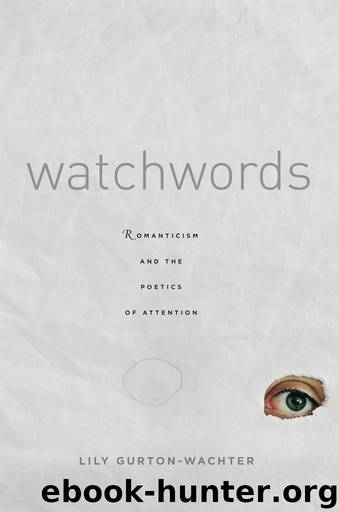Watchwords by Gurton-Wachter Lily

Author:Gurton-Wachter, Lily [Gurton-Wachter, Lily]
Language: eng
Format: epub
Publisher: Stanford University Press
Published: 2016-04-14T16:00:00+00:00
CHAPTER 5
ATTENTION’S ACHES IN KEATS’S ‘HYPERION’ POEMS
What are the stars? There is the sun, the sun!
And the most patient brilliance of the moon!
And stars by thousands! Point me out the way
To any one particular beauteous star,
And I will flit into it with my lyre,
And make its silvery splendor pant with bliss.
I have heard the cloudy thunder: Where is power?
Whose hand, whose essence, what divinity
Makes this alarum in the elements,
While I here idle listen on the shores
In fearless yet in aching ignorance?
—John Keats, Hyperion: A Fragment
IN JOHN KEATS’S abandoned epic poem, Hyperion: A Fragment (1819), the soon-to-be god Apollo’s strange question “Where is power?”—as though the abstract noun power were typically locatable but temporarily missing—links auditory attention (“I have heard the cloudy thunder”; “I here idle listen”) with war’s dislocation of power.1 Both of Keats’s Hyperion poems take place during the Titanomachy, or the War of the Titans, the shift in power from the Titan to the Olympian Gods. They occupy the period of transition following Saturn’s fall from power but prior to either Hyperion’s fall or Apollo’s rise.2 Hyperion’s power is thus in jeopardy, and the power that Saturn once held and that Apollo will soon hold belongs to no one—thus the question: Where is power? The aches of a power that is not yet and no longer embodied in a single sovereign is another way of describing the pains of this war. Keats’s question is followed by another question that we might read as simply rephrasing the first: Who made this alarm? For reading this alarm in the sky in the context of wartime alarmism draws attention to the way Keats links power to the creation of alarm, highlighting alarm’s fabrication even in the most seemingly natural or neutral of settings, like the elements. Power resides, Keats suggests, in whoever “makes this alarum.”
“Where power is,” William Hazlitt writes in “What Is the People?” an essay published in 1818, three years after Waterloo and the same year that Keats began Hyperion:
Where power is lifted beyond the reach of the law or of public opinion, there is no principle to oppose it, and he who can obtain possession of the throne (by whatever means) is always the rightful possessor of it, till he is supplanted by a more fortunate or artful successor, and so on in a perpetual round of treasons, conspiracies, murders, usurpations, regicides, and rebellions, with which the people have nothing to do, but as passive, unconcerned spectators.3
As though anticipating and answering Keats’s question “Where is power?” Hazlitt points to the tautology of force—he who can obtain the throne is always its rightful possessor, when power is lifted beyond law. Writing in the aftermath of Waterloo, both Hazlitt and Keats had seen the indefinite suspension of law, specifically of habeas corpus, as a function of wartime fears on and off since the 1790s. We might thus read Keats’s depiction of Apollo’s listening to the alarm in the elements as a figure for these “passive, unconcerned spectators,” for “the people,”
Download
This site does not store any files on its server. We only index and link to content provided by other sites. Please contact the content providers to delete copyright contents if any and email us, we'll remove relevant links or contents immediately.
Still Me by Jojo Moyes(11245)
On the Yard (New York Review Books Classics) by Braly Malcolm(5520)
A Year in the Merde by Stephen Clarke(5405)
Eleanor Oliphant Is Completely Fine by Gail Honeyman(5258)
The Bookshop by Penelope Fitzgerald(3838)
How Music Works by David Byrne(3252)
Surprise Me by Kinsella Sophie(3104)
Pharaoh by Wilbur Smith(2984)
Why I Write by George Orwell(2942)
A Column of Fire by Ken Follett(2596)
Churchill by Paul Johnson(2572)
The Beach by Alex Garland(2553)
The Songlines by Bruce Chatwin(2544)
Aubrey–Maturin 02 - [1803-04] - Post Captain by Patrick O'Brian(2297)
Heartless by Mary Balogh(2255)
Elizabeth by Philippa Jones(2195)
Hitler by Ian Kershaw(2187)
Life of Elizabeth I by Alison Weir(2068)
Harry Potter and the Cursed Child by J. K. Rowling & John Tiffany & Jack Thorne(2055)
